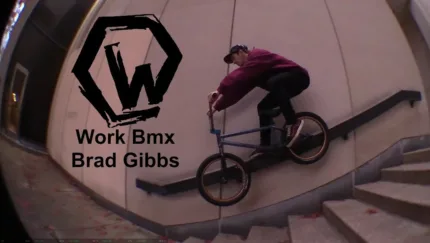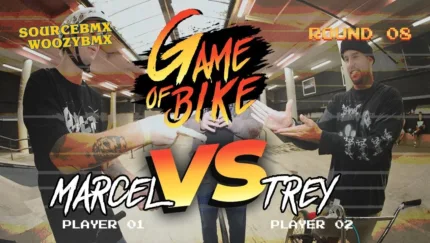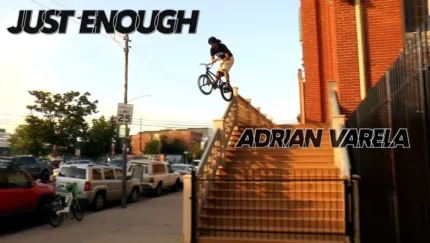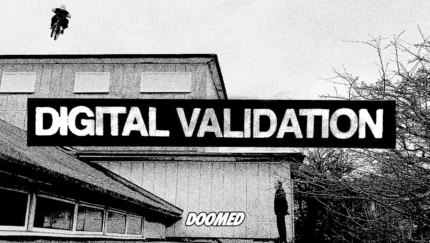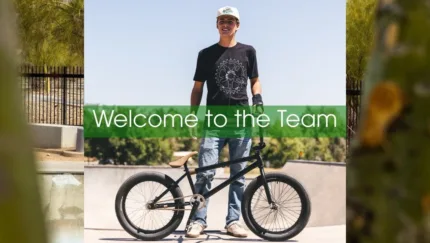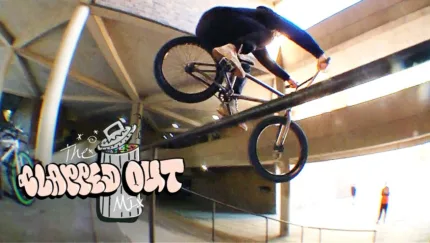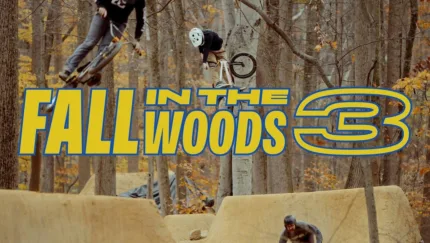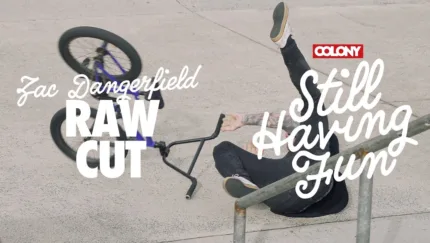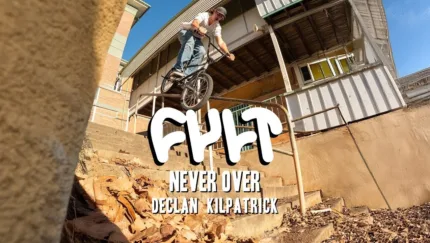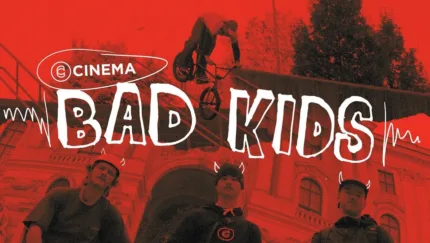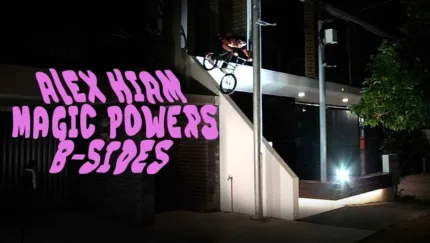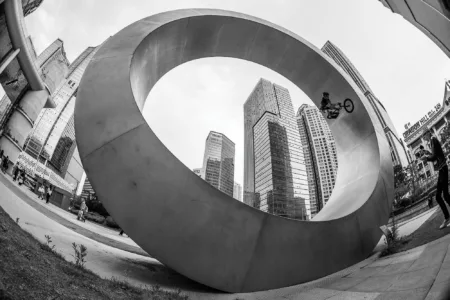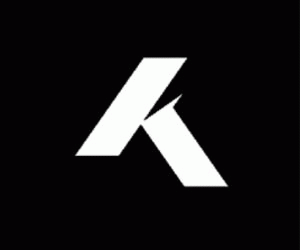
GET TO WORK: A conversation about D.I.Y. BMX frame building
A flavour of the passion that drives the D.I.Y. ethic
Photos by Tom Beckman | Article originally printed in DIG MAGAZINE issue #2020 - Dec 2020
This conversation was recorded with long time BMX frame builder John Corts in Ithaca NY, on Sunday July 12th 2020, in the Work Frames shop (aka Johnny's garage) with friend and photographer Tom Beckman and fellow D.I.Y. frame builder Ben Smith from WHTHOUS on a video call.
Johnny has been completely obsessed with BMX and the D.I.Y. aspect of it for so long and he's always been behind the scenes bringing the world solid bikes whilst shredding along the way. Read on to find out more about his latest venture 'Works' and get a flavour of the passion that drives D.I.Y. frame builders to do what they do.
Owner operator Work Frames
-
Owner operator WHTHOUS BMX
-
BMXer / Photographer

Tom: What made you want to start building bikes?
Johnny: I grew up tinkering around in my Dad's barn. So once I started riding I started making little things that I could like drop outs or chain tensioners with my dad's arc welder, they were shitty, but worked. I asked my dad to weld a frame for me and he looked at me like I was fucking crazy, cuz he's not gonna stick weld a frame. But I knew that's what I wanted to do. I was like, 14. So once I came of age, I went to a vocational school instead of high school, which stopped my academics, but went on to learn how to weld. First got a job at a muffler shop HMF in Brooklyn, Ohio, a small suburb of Cleveland. We were doing FKR frames out of there with "Toledo Joe" Joe Purcell, and Josh Shriver, another Cleveland area local.
Ben: How old were you when you were at the muffler shop?
Johnny: I started when I was 17. Right after I graduated high school. Actually, like the last little bit of vocational school, I knew I had the job. Joe set it up. So as soon as I told my teacher that I have a TIG welding job, he just took me off of all the shop jobs at the school and threw me right into the TIG booth. Just had me start practicing TIG welding for like the last, shit, almost six months of schooling, just so I could get caught up and be able to actually do some work when I got out.
Ben: What was the vocational school where you went like? I never went to one. Were you just basically welding?, or did they make you do technical math and some things like that?
Johnny: There was actually academic courses, but they were pretty much bullshit. So, half the day was shop class. And the second half of the day was academics. When I first got there, as a junior, we were adding and subtracting three digits. So I thought, well, I don't have to do any more math. So I brought a TV in there with a VHS player and just put Criminal Mischief on every day.
Ben: Did you ever kind of stray off the path of BMX, or was that just kind of just always on your mind? A lot of guys change course when 16 comes around, you get a car, or like your driver's license, and that's like the tipping point of, are you gonna stick with BMX or not?
Johnny: When I got a car, it was like, cool, I can travel further. I can actually go to Cleveland now as opposed to the 10 mile pedal to Chenga or the small town that I lived in. We're gonna go all over the fucking place. Yeah it's never strayed from my mind. My objectives, I guess you could say.
Ben: So you were still wanting to stick with BMX through and through?
Johnny: Yeah, absolutely.
Tom: What started the frame building at the muffler shop?
Johnny: Um, that was Joe Purcell. He had started a bike company at the muffler shop, just the place he found in the local area that would make the frames. The first one was based off the Fit Series One. So I built that when I first got there, and it was not my frame, haha, it fucking sucked to me. When it came time for me to make another one I started, you know, modifying the fixture and made a shorter back end, a steeper headtube angle and started making it more towards my liking. Made a couple of those before that series ended. It was initially called Capricorn bikes from what Joe started, and then when he kind of got out of it, he started riding bigger bikes, I believe, like more DJs. And then we kind of changed the name to FKR and started doing our own shit. Josh Shriver, and I.
Tom: What got you to New York?
Johnny: Kerry Sayer. He was an old Mutiny rider that had worked at Chenga and I knew him through there quite well. Then he got a job at FBM as a salesman. Once Brock left, he started contacting me to kind of get me out there to you know, try to get me into the shop. It took me nine months to decide to do so because that's a big move. But I finally got myself annoyed with working at the muffler shop long enough that I chose to come out. We had taken quite a few trips out that way to visit Kerry, hang out and ride something new. And then decided to move out. My first day was right after the Fourth of July, in '04.

Tom: Just a good time in life for change?
Johnny: Yeah. Yeah. I mean, I was 18. So I was like, Well, I can move out. I don't like my job now because I don't really give a shit about welding exhausts for four wheelers and sport bikes. It's not my shit. The frame building thing is a difficult thing to kind of get started. Which I'm now doing all over again. But it was fun. You know, it was a good I got to learn underneath Dave (Harrison). So, I mean, if nothing else that was the best place to go to start doing this shit. Who better to learn under?
Tom: Yeah. And then time goes on. You take a break from FBM?
Johnny: Yeah, I just wanted another change, another move. So I moved out with my brother to California by way of Louisville, and ended up being out there working at a bike shop as a mechanic, but missing the actual building aspect of it. So I went up and worked with Aaron Huff at Solid for a little over a year, I'd say.
Ben: I always thought it was rad you were telling me when you were at Solid and you were basically sleeping in the in the shop there just on frame boxes.
Johnny: Yeah, I lived in San Diego and Solid was in Sacramento which is if the roads are empty about an eight hour drive, but it usually took around 12. Fucking LA! But yeah, I'd go up for a week or two and work 12-16 hour days, just hammer the fuck out of it. Then I come back home for a couple weeks to a month and then go back. But yeah, when I was up there, I didn't have a place. So I just slept on the shop floor,
Ben: When you went from, the muffler shop up to FBM, how did it feel as far a jigs and fixture wise just changing from like there to FBM? You know, I'm sure you were just kind of working with what you had at the muffler shop. And then you get into that facility is probably a pretty big change, I imagine.
Johnny: Yeah, the fixtures that we had at HMF was very rudimentary. It welded completely different because we didn't know a weld sequence. I think Colin Winkelman had come in, and he had talked about how he had seen frames built when he was in Taiwan. I'm pretty sure that's who Joe was telling me about. So all the welding sequences came from that. So when I got to the FBM jig, I welded it just like I did previously. The down tube ended up being way the fuck off on the bottom bracket. It was bad. Cuz Dave was just like, Here you go, go for it. And it was not the same. So second frame was much better. It was still square because it was made in those fixtures. But like, before, I would put a bigger weld on the down tube before the tack. So it pulled it over before I got to the bottom bracket, it was it was a mess. Rode fine haha.
Ben: Yeah. That's cool. Yeah, It's just always interesting seeing aspects, seeing what other people use and how they build them and things. I always find that interesting.
Johnny: Yeah, it was a decent fixture made the clamp everything. But your top tube, and down to the way it sat on the head tube, was the same for every top tube length. Like in the same spot. So it actually changed on the head tube. So the longer the top tube the lower the top tube sat from the top of the head tube.
Ben: Okay, mainly aesthetics, though.
Johnny: Yeah, it was definitely just an aesthetic thing.
Ben: How long were you at FBM? Like how long before they closed?
Johnny: Um, it totaled just over 12 years. The first time was just over six, shit almost six to the month really. Then the second time was, I think about six and a half years.
Ben to Tom: You worked there, too, right?
Tom: Yeah, I was there for a couple of months. That was when Johnny was in California.
Ben: Okay. So it seems like that was kind of like just the epicenter of the scene in your guys' area.
Tom: Definitely. FBM and ECT.
Johnny: I mean, when East Coast closed that was pretty much nearing the end of the Binghamton scene, as large as it was.
Tom: Yeah, it shrunk by a lot once that closed.
Johnny: For folks that don't know that's East Coast terminal. Really well built Park. Really fucking fun. It was one of those parks that you could have a few hundred people and everybody could keep riding. Then when it was empty, you could ride the whole park as one park. You don't see too many of those around anymore. Now they're kind of rare birds nowadays.
Ben: It seems like you're still helping out. You know, you're hooking up people in that area or just in the Northeast area in general and trying to just keep cool things going.
Johnny: Yeah, trying to. Tom's been digging at the acres again, and I'm slowly working on a backyard ramp. Trying to get the scene going again, man.
Ben: Are you doing any jams or anything like that in the future?
Johnny: Yeah, I would like to, I was doing a street ride in Syracuse every year. I think we got two or three in before FBM closed. Yeah, this would have been the third year with the Leeper bros yeah, they were kind of Leeper bros rides, with assistance of Grindworks and the No Worries Crew. Yes, I want to do the street rides at some point.
Tom: One thing that I wanted to know is what spoke to you about the name Work?
Johnny: It makes me happy. I like working, doing work. It's a good thing to have is like a personality trait. It partially spawned from I was wanting to use a different name for the shop and the bike brand. But I wanted it to be a word that's in the shop name to use for the bike brand. So I can just drop part of it. I ended up doing JC Metal Works where I drop everything except for Work and kept that as the frames name. Then I came up with a fun logo that I liked so it all kind of just lined up to where it worked out for that hex type logo. I liked it. So I was like this is what I'm gonna stick with. Plus, it's largely thoughtfully the mind-set that I would like instilled in people nowadays that I feel is sort of slowly getting lost. You gotta work for things and we all need people to work otherwise it's just gonna suck.
Ben: Yeah, when he told me the name I, it's just, you know, it's one syllable, it's just straight to the point, and I thought it was really good right away, it just sounded good.
Johnny: Sweet, thanks. Simple, it's easy to say, you know. It gets right to the point, you know.

“I'd like to keep the prices as low as I can So a kid can ride frames that I build... especially with them not really having many places where they can get jobs.”
- John Corts
Ben: With moving from FBM into your shop and going off on your own, you're kind of starting from square one, as far as like getting tooling and sourcing everything. it's just kind of going right from the ground up again. We've talked in the past because we're both building frames and kind of doing the doing the same thing. And I think the common theme that comes back is working with what we have as far as tools and resources go. Do you find that to be more of a challenge or, kind of more of a burden? Or is it kind of like a fun challenge to just make do with what you got?
Johnny: I really enjoyed doing it, I do miss the ease that it was because it was already set up and good to go. I'm excited to build new fixtures, to modify the things that I didn't like about what I used. Make new fixtures that are completely different. Or like I ripped off the bridge miter fixture that you did , but modify it to fit my set up. So it's fun to be able to put my own thoughts into it, considering I had been doing it for 17 years. Now everything is on me, so I gotta get the money to build all that shit first, which is the new challenge. But it's mostly exciting. Mostly.
Tom: So, with Work, as far as the frames, what are you going to produce in your shop. What are you trying to do kind of different than the rest of the industry?
Johnny: Um, I just like building them, ha... So I want to try to keep figuring out a way to make frames in the states that's affordable for anyone to be able to purchase. I'm building from my home, and doing my own powder coating. Little things.
Tom: What about geometry on customs? You want people to find out what works for them kind of thing?
Johnny: Yeah, I mean, building customs is probably my favorite type of frame to build. As a builder, I've spent my life searching for the geometry that I prefer. I want to help others do so as well. So I'm trying to make it so that people can afford to start. You know, it's not like it's super cheap, but affordable to be able to find their geometry too. Experiment with stuff and, you know, kind of make their own sort of signature frame. I bought a craft die cut machine. So I can make stickers for your frames and do different colors. I think I got around 90 colors in stock, which I don't charge extra if you choose one. I have small up charges for geometry modifications, so if a stock frame is close to what you think you might like, but you want to change one thing, a small upcharge for one of the geometry changes. That's one thing that I want to make sure that I put out there is available.
Tom: How many stock models are you doing right now?
Johnny: Right now I have to kind of have three. One I call Tempest. I've made a couple of prototypes of the trail frame which we're calling Squirrel Catcher. And then there's a street frame that I made a prototype of that our team rider Brad Gibbs is riding it's called Easy Street.
Ben: I like all those names a lot. But yeah, from what it seemed to me at FBM you were making the frames but you weren't doing a lot of the other sides of the business, just because you had your own job role there. Do you enjoy having full reign now where, you know, it is more 'work', no pun intended, but you get control of everything. Now you can do the graphics, the name the colorways, choose how you want to promote the frame - everything. It's a blank slate Do you like that or does it seem overwhelming sometimes?
Johnny: I really do like it, but it does. Sometimes I'll be shutting the lights off and I'll look into the shop and go "I don't feel like I did shit today". But I did a lot on the computer, screening questions and looking at graphics and trying to come up with different shit. So it doesn't feel as visually as progressive. I guess I could say, but I really do enjoy it. It's wonderful. Plus, I have a bunch of friends that help like Tom and my buddy Kielb, my brother, when I have an idea I don't like only listening to the echo chamber in my head especially when you work by yourself it just bounces around. I like to get some external input on things. Like when I came up with the thought for squirrel catcher. I threw it to a few people just to see if I was insane or if it was pretty cool. Not that I really care what people think but it's good to get external input sometimes.
Ben: Yeah especially if they if they're really honest with you, and tell you if they do or don't like it. Not just 'yes' men.
Johnny: Yeah, that's one thing that I want to try to get right now it's easier because I haven't built a whole shitload of frames under Work, but I want to try to keep up on asking people who have gotten customs and have bought frames how they like it, and then try to really make sure that they know I'm fine with criticism or, you know, anything like that. I don't take things personally.

Ben: Do you feel like now since you're kind of working for yourself you have more of a personal connection with each customer when building the bikes?
Johnny: Yeah, it does feel much cooler. Specially when a custom comes through, like I got an email for a custom that had every single little detail already done, and I got so happy when I read it. I'm like, I don't have to do shit. Not that I don't want to because I do I want to figure out your geometry. I want to figure everything out with you if you need it, or if you need the help, but he knew exactly what he wanted. And it was awesome. Like fuck yeah, man!
Ben: I think it's cool that there's still some guys, like yourself, that can cater to things that some riders want, you know, that they just don't in a mass produced frame. And as far as BMX, it seems like it's kind of a dying breed of, you know, smaller companies or companies that are building their own stuff. But that's definitely something I always am attracted to now. Like we were talking, with Derrick Girard for example doing sprockets and stems and things. And it's cool that there's still kind of that underground. Industry within the industry itself.
Johnny: Yeah. I mean, that's why I was super stoked too, like, when I came out to help you out, get your shop running and show you the fixture that you bought. It made me really happy to see somebody wanting to do the same thing that I do.
Ben: Yeah, yeah. And that was a blast. Just like we were talking. It was kind of like a bike trip with no bike riding. Like, I'm kind of helping the competition right now. But it doesn't even feel like that. You know, it's more of kind of just helping BMX as a whole.
Johnny: Yeah, I think so. I mean, I don't look at it as competition. Although, through the business mind-set it's probably a little bit should but I don't give a shit. To me, it's like just like bike riding, I would be pumped to see somebody learn a new trick. Just like I'm pumped to see you making shit too.
Ben: Another question I had, kind of always gone back and forth when I've seen your stuff. And I'm like, this guy is an incredible welder. You know, and you could be in almost any industry. Like you could be welding headers for race cars, and you could be doing chassis work for race cars, or welding pipeline and making tons and tons of money. But you're still choosing to stick with BMX, you know? Does that ever cross your mind? Or are you still just kind of stuck with staying in BMX?
Johnny: I wouldn't say it hasn't crossed my mind. But especially right now, the way my family life is, my wife, she's got the career job. So she takes priority. And we have two girls, so I stay at home with them all day. For me to even work during the day, I'd have to make double what I was making just to pay for their day-care. So it really, it wouldn't do any good for me to even look at anything else. Truthfully, because I want to be there while my kids are growing up. I don't want to have them raised by others and come home and be able to only hang out with them for a short period of time before it's bedtime.
Ben: Yeah, that's cool. I had noticed when you were still at FBM, at a certain point when you had your first child, you were doing nights there. And then when I talked to you, you're like, Oh, yeah, I take care of Fiona in the day. And then work at night. I'm like, this dude doesn't sleep.
Tom: Zombie for two straight years.
Johnny: I was probably I was getting an average of four hours of sleep a night. I mean, it was it was worth it. I got to continue doing what I like to do and got to keep hammering away but man getting home at three in the morning and then waking up at seven. To watch that bit with my little girl all day was wild. And she's always super energetic and ready to go and play. So you just fake the fact that you're not tired. Lots of coffee.
Ben: Yeah, it kind of shows your dedication to the craft of building bikes and BMX itself. Do you enjoy certain parts of the building process more than others?
Johnny: I like building a full custom the most. But I really, really enjoy running through a whole batch of frames, just straight welding it. Like you start really getting into a groove, your welds never look better than when you're a few frames into the batch. You start racing yourself getting your beads looking better and better. Especially if you're inspecting each one after you do it. You just get into that groove. It's kind of like riding a bowl and finding a line. And then just dialing that line in to where it's just like, effortless, you know, flowing your pump, you're hitting every pump.
Ben: When we've talked also you always mentioned that you get stoked on production. I'm still just kind of getting fresh into this, but sometimes doing the same thing over and over, you get kind of kind of worn out a little bit. Yeah. But I think once, like you said, once the frames are tacked, and you start welding, you really can just learn a lot, just from the past the next one to the next one. And I think that's really cool. Are you always thinking about how you can improve things?
Johnny: Oh, absolutely. I'm still learning new things. I still even learn new
sequences for welding, I actually just changed it recently, how I'm doing them for a little bit. My machine doesn't have a pulser anymore, so I just can't weld as fast as being a cyborg. So I've turned it from two weld sequences into three, so that I can keep my heat zones down. So I'm learning a new pattern there, which is kind of fun.

Tom: A while ago, you were talking about the future of the shop, like kind of building everything in-house. Is that still the goal?
Johnny: That's a long-term goal. I'd like to be able to if I can build a whole frame in shop. So it's something I'm aiming towards. span class="Apple-converted-space">
Tom: So you want to do like head tubes, bottom bracket shells?
Johnny: Yeah, I'd love to be able to do that. It'd be so much fun. It'd be just because I really enjoy this. I'm almost as passionate about building bikes as I am riding them. And it's kind of changing that way as I get older with family stuff and everything. So it's almost just by force it's becoming more enjoyable, just all aspect of frame building. I mean, that's part of the reason why I powder coat in house because I just, I want to be able to do the whole product. It just would make me the most happy. I mean, obviously I'm not gonna mill tubing.
Ben: How often are you riding now?
Johnny: I try to ride once or twice a week. It hasn't been happening lately. I normally try to ride once during the day during the week, maybe with a person and call that on the clock time. And then I'd been working on doing a midnight ride downtown, just to kinda do some thinking and stuff like that while I'm cruising around. Sometimes I ride a lot, sometimes I think a lot, it really depends on how the manuals go ha. When I ride by myself a lot I do a lot of manualing
Ben: Are you planning on selling frames to shops at all?
Johnny: I'm not against it. What I would like to do more in that aspect is shop frames. Small batch frames for shop costs on a frame. Like for a shop why not make it your frame?
Tom: Like Circuit frames?
Johnny: Yeah, like Circuit's Anchor frames and the new Rooster. That way the shop can call it their own. It's just difficult to afford an American made thing and have them all be sold through shops. Sure, it's unfortunate, but it's sort of the truth.
Tom: Yeah, just kind of the realities of how things are going. Metal pricing is always fluctuating and shipping and just all the logistics of it all.
Johnny: Yeah, like where I was getting dropouts made for 40 dropouts, the price just went up 200 bucks, just for raw material. So it's still going up. And I'd like to keep the prices as low as I can. So a kid can ride frames that I build, because especially with them not really having many places where they can get jobs.
Ben: Yeah, that's cool for any shops or people from shops that are listening, and they want to kind of get that going. I always get stoked when I see that if a bike shop does that, because, you know, they're kind of the epicenter of their own scene and then kids, riders get to represent that shop and brands that they're just more in touch.
Johnny: Yeah, like, I think that would be cool. Like, you get to support me, and you get to support kind of more your shops name.
Ben: It's just kind of cool to hear the backstory of where you started, and where you're at now and seems like you've been a man dedicated to the culture for a long time. And It definitely, always inspired me with what I'm doing just kind of seeing what you've been doing. And just the level of work you do. And then when I saw your level of riding, I was like, Damn, this dude rips too, like just across the board doing cool stuff. So I was really excited to kind of get to help get this together. It's always fun to chat and kind of hear someone else, kind of doing the same thing. There's perspective and I think it's just cool to see more stuff like this pop up in BMX.
Johnny: I agree
Tom: Yeah, like real grassroots DIY. Pretty much the essence of DIY and BMX. Build your own bike, build ramps, go ride.
Ben: Yep. Yeah. It does seem like there's a bit of a resurgence of that, kind of coming about lately. And it's just always great to see and just talk with other dudes that are about it. I mean, we're basically at opposite ends of the country, but it's always great to chat and just kind of see what people are doing in their own local community with bikes in general. Which is kind of neat to see. So I'm stoked for the future of Work and hopefully some people that hear this want to get something going with you. Keep the business moving forward, and progressing.
Tom: What's the best way for someone to kind of get at you and contact you about doing a frame?
Johnny: Instagram: @jcortsmetalworks, Email: jcortsmetalworks@gmail.com Website: workfab.bike

“wWhen I have an idea I don't like only listening to the echo chamber in my head especially when you work by yourself it just bounces around. I like to get some external input on things.”- John Corts
Previous
BROTHERS - MIKI FLECK & JAUME SINTES
Miki & Jaume on the loose in America
Next
WETHEPEOPLE 'LUCKYS' PHOTO JOURNAL
A Yorkshire adventure with Wethepeople UK
Related Content
















